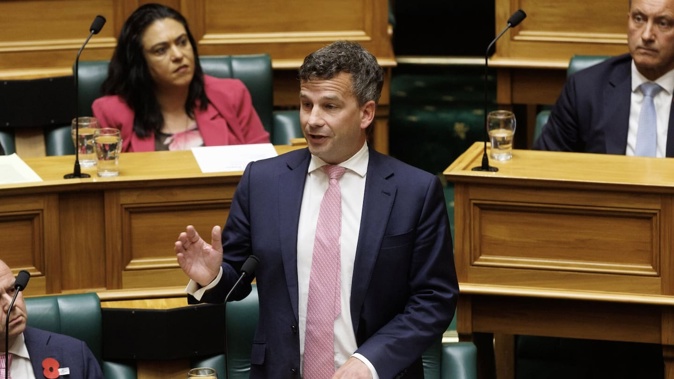
- The Waitangi Tribunal is holding an urgent hearing on the controversial Regulatory Standards Bill.
- Critics, including Māori leaders, argue the bill lacks a Treaty clause and could impact Māori rights.
- David Seymour says the bill reduces red tape and improves lawmaking transparency, but 88% of submissions oppose it.
The Waitangi Tribunal will hold an urgent hearing today on a piece of legislation fierce critics have described as “dangerous” and akin to the recently defeated Treaty Principles Bill.
The Regulatory Standards Bill (RSB) will be introduced to Parliament next week.
The tribunal needed to bring forward its hearing on the proposal to this week as it is required to submit its report before the bill is introduced.
The minister behind the legislation, David Seymour, says the RSB will make it easier for New Zealanders to go about their business with less red tape “so we can all live longer, happier and healthier lives”.
But, in submissions to the tribunal, a group of high-profile Māori and academic leaders have shared their criticisms of the legislation.
Their concerns include the lack of a specific Te Tiriti /Treaty clause in the proposal, the lack of consultation with Māori, and the impact on Māori and constitutional rights.
Dr Carwyn Jones, head lecturer for Māori laws and philosophy, Te Wānanga o Raukawa, said in his submission the bill would “create one of the most fundamental constitutional shifts in our legal history” by elevating the RSB principles above the Treaty Principles.
“The RSB and Treaty Principles Bill [TPB] represent a combined legislative pincer movement where the RSB seeks to finish what the TPB started.”
 Dr Carwyn Jones (Ngāti Kahungunu and Te Aitanga-a-Māhaki).
Dr Carwyn Jones (Ngāti Kahungunu and Te Aitanga-a-Māhaki).
The tribunal is expected to submit a report following today’s one-day hearing in the coming days; however, its recommendations are not binding.
The legislation in a nutshell
Passing the RSB is the latest in a years-long attempt by the Act Party to introduce this type of legislation. The bill would introduce principles for responsible regulation, covering things like the rule of law, the taking of property, fees and levies, and good law-making.
Agencies would need to assess the consistency of bills with those principles. Government departments would need to review their regulatory systems, and the Ministry for Regulation would gain new powers to improve the quality of legislation.
A new regulatory standards board would be established to review whether legislation aligned with the principles. This could be prompted by a complainant, a minister or by the board itself.
Seymour says this would make lawmaking more transparent by shining more “sunlight” on what politicians do and increasing “political penalties of being a bad lawmaker by making it easier for voters to understand making a law for them”.
 Prime Minister Christopher Luxon and Act leader David Seymour after signing their coalition agreement in November 2023. Photo / Mark Mitchell
Prime Minister Christopher Luxon and Act leader David Seymour after signing their coalition agreement in November 2023. Photo / Mark Mitchell
“Under the Regulatory Standards Bill if you don’t ask and answer the right questions before you make a law reform affecting people’s rights then someone can go to the regulatory standards board and make a declaration that actually you’re not a very good law maker.”
There were about 23,000 public submissions on a discussion document on the proposal over a roughly two-month period last summer. Most (around 88%) were in opposition with just 0.33% supporting or partially supporting it. The rest didn’t have a clear position.
“If you look at the serious and substantial submissions and the real debate here, red tape’s a problem. This is a very robust solution,” Seymour said in response.
“It will make it easier for New Zealanders to use and develop their property, whether it is their house, their business, their farm or perhaps just run a daycare.”
Seymour attributed Dr Bryce Wilkinson’s “Constraining Government Regulation” as laying “important groundwork” for this bill.
Wilkinson, of the NZ Initiative, told the Herald the “biggest misunderstanding” around the bill was the preservation of Parliamentary sovereignty.
“It allows Parliament to do absolutely anything it wants ... as long as they are upfront about it.
“All they have got to do is disclose that there is an inconsistency with the principle, but they are going to go ahead anyway.”
Wilkinson said although New Zealand’s systems stacked up well by international standards, there were widespread deficiencies that should be improved.
“What can usefully improve our systems so we are less likely to have these egregious problems like the big shortage of housing which is causing so much grief to so many younger people?”
Lady Tureiti Moxon, managing director of Te Kōhao Health, said the bill was a “a dangerous and direct threat to Te Tiriti o Waitangi and the rights of Māori”.
 Lady Tureiti Moxon says the bill fails to honour Te Tiriti.
Lady Tureiti Moxon says the bill fails to honour Te Tiriti.
“The bill is a continuation of a system of domination, mono-culturalism, suppression, exploitation and assimilation known as colonialism.
“It seeks to establish principles for creating laws and regulations in New Zealand – an act that impacts the legislative framework, law-making, and governance, yet fails to honour Te Tiriti.”
University of Otago professor Andrew Geddis said in his written submission to the tribunal on the bill the potentially most significant constitutional aspect of the RSB was that it excluded mention of Te Tiriti / the Treaty – “While at the same time seeking to establish a compliance framework for all future legislation / regulation that largely reflects the Act Party’s particular formulation of what ‘good law-making’ is.”
“In many respects this means that the bill is as constitutionally significant as the Treaty Principles Bill was.”
Julia Gabel is a Wellington-based political reporter. She joined the Herald in 2020 and has most recently focused on data journalism.
Take your Radio, Podcasts and Music with you









